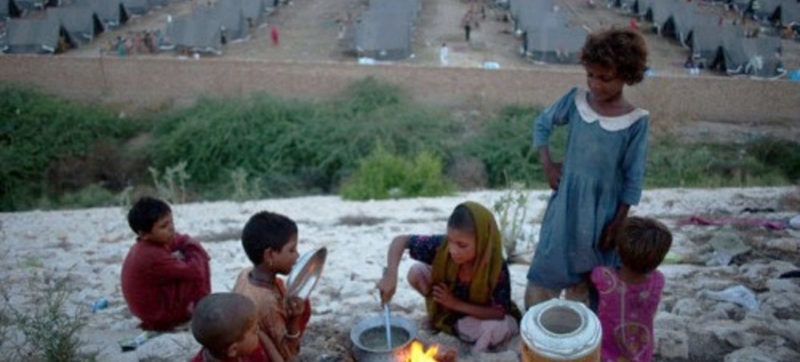As I write these lines, millions are stranded and vulnerable to disease in the wake of perhaps the greatest natural disaster of recent times. Communities in Khyber-Pakhtunkhwa are stranded, Sindh is facing the wrath of gods and parts of Muzaffargarh and Kot Addu have been washed away. Citizens across the country are perturbed and doing whatever they can. But the power centres including the free media are busy in point-scoring and blowing their little trumpets as if the devastation was a playground for political mileage.
They say that individual and collective characters are exposed in times of crisis. Indeed the Pakistan ruling classes have exposed themselves for their historical myopia and lack of vision. Political parties are fighting over optics, media perceptions and wasting their energies. TV channels and wise anchors on the other hand are competing who got there first to show the mammoth destruction and who fired more salvos at Asif Zardari. Adding insult to injury, the media remained busy for hours as to the alleged shoe-throwing incident at the president as if that was the topmost priority of this country.
Yet again we are also hearing how the civilian administration failed (and what is new about that) and how the only organised institution, the Pakistan Army, is saving lives. This is propaganda since the army is not something separate from the state. We are proud to have such a disciplined army but the media spin-doctors need to inform the people that it functions through the public exchequer and is an institution under the civilian government.
If anything, the attention of analysts and opinion-makers has been diversionary and divisive. A perfect script for a black comedy except that we have no time for either comedy or indulgence in melancholic fits. What is required is action – and that too concerted, purposeful and full-throttled devoid of provincialism, political bickering and abuse.
A national commission representing all political parties, the chief ministers and the army needs to be formed to devise a short-term early recovery strategy. This commission should also look into how the country will manage the medium-term effects of the disaster and how food, shelter, medicines and livelihoods for the millions will be provided. Nothing short of a national plan and mobilisation will do. Whilst the civil society will do its bit, the state has a paramount role in responding to people’s interest and welfare.
A few days later when the flood recedes, epidemics, God forbid, are likely to break out. Those who are prone to contract a serious disease after losing their livelihoods are not going to care whether it was the PPP or the PML who provided them relief. Such erroneous perceptions of political gain are brutally insensitive. Similarly, about time the political parties shun their usual short-termism. Above all the media owners now must intervene to stop the playing of political battles through slanted reporting and irrelevant analyses.
Published in The Express Tribune, August 11th, 2010.



